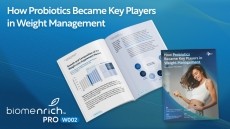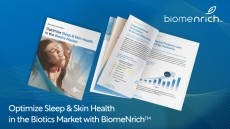Nimble Science builds on small intestine sampling for microbiome research

Speaking at the International Scientific Association for Probiotics and Prebiotics (ISAPP) annual meeting last week, Joseph Wang, PhD, co-founder of microbiome tech start-up Nimble Science shared results of a new study confirming the efficacy of the company's SIMBA GI Health Platform in accessing multi-omic data of the gut microbiome.
FREE Personalized Nutrition webinar
Interested in learning more about the biohacking and personalized nutrition trend? NutraIngredients will host a webinar on the topic on Thursday July 25th at 4pm CET.
Presenters will include: Mariëtte Abrahams, CEO and Founder at Qina; James Brown, Director of Nutrigenetics and Founder at Muhdo; Sabina Bruehlmann, CEO at Nimble Science; and Grégory Dubourg, CEO at Nutrikéo.
The platform is powered by the company’s SIMBA capsule, a small ingestible capsule designed to autonomously collect and preserve an uncontaminated small intestine fluid biopsy.
Researchers from Nimble, based in Canada, recruited 20 healthy participants to ingest the SIMBA capsules at baseline and seven days later, along with a probiotic capsule containing a blend of L. rhamnosus R0011 and B. longum R0175.
The aim was to assess the ability of SIMBA capsules to reliably capture samples for small intestinal (SI) microbiome analysis, Wang said.
Findings indicated that the capsule sampled in the right area of the intestines and that the baseline SIMBA microbiome profile was significantly different from the fecal microbiome profile. SIMBA also successfully detected a concurrent probiotic intervention in the small intestine, which was not detectable using stool samples.
“The high accuracy of sampling location and sealing efficacy of the SIMBA capsules makes them potentially useful research tools in clinical trials for studying diet-microbiota interactions in health and disease,” the researchers noted.
They added that results marked a "significant advancement in microbiome research, complementing traditional fecal sampling procedures and expanding our capabilities to explore the complexities of the gastrointestinal microbiome."
Microbiome testing
Microbial imbalance in the small intestine is linked to conditions like small intestinal bacterial overgrowth (SIBO), often associated with other gastrointestinal disorders.
However, as Wang explained, SIBO diagnosis is challenging due to the difficulty in sampling the small intestine, noting that traditional methods like duodenal aspirate are invasive and have technical limitations, and newer methods, like 16S RNA gene amplification and metagenomic analysis, offer non-culture-based profiling of the microbiome.
He noted that while it is widely recognized that the gut microbiome differs from the fecal microbiome, the industry has overly relied on stool samples as a complete representation of the gut microbiome.
Yet now there is a growing recognition of the need to incorporate this new data to account for spatial and temporal variations in the microbiome, and the Small Intestine MicroBiome Aspiration (SIMBA) capsule was designed for minimally invasive sampling.
Small intestine samples
The SIMBA capsule first underwent in vitro validation experiment to assess the possibility of contamination after sample collection and sealing of the capsule through the simulation of conditions of capsule transit through the GI tract and potential shipping and storage conditions.
Results showed that there was no contamination in 29 out of the 31 test capsules as demonstrated by the absence of detection of L. rhamnosus R0011 in the capsules’ cargo.
In the follow-up clinical study, participants ingested two SIMBA capsules simultaneously, and X-ray imaging was used to confirm the timing and location of the capsules.
A week later they ingested one capsule containing the probiotic blend, as according to the researchers, 'probiotic interventions are reputably difficult to monitor after one dose using stool samples'.
Once the imaging verified that capsules had completed sampling, participants were provided with capsule and stool collection kits and discharged. Upon excretion of the capsule, patients collected the capsules and a stool sample from the same bowel movement and returned it for analysis.
Assessment of the capsules and samples showed that the capsules performed safely and reliably for collection of SI content. X-ray tracking confirmed that 97.2% of the capsules completed sample collection in the SI regions before reaching the colon.
In samples originating from the small intestine, alpha diversity measures were lower in the capsules compared to the stool samples, which the researchers suggested gave a more accurate reading of diversity.
“This study’s results suggest that the SIMBA capsule is ready for use in studies aiming to elucidate microbiome-diet interactions,” the authors concluded. “This technology has the potential to transform our understanding of the gut microbiome and its role in health and disease.”
They noted that next steps in research are to compare results from fresh small intestine samples collected by endoscopic aspirates in diseased populations, and that 'in future probiotics studies, care should be given to allow enough time for washout of the probiotic bolus before ingesting SIMBA in order to study the effects of repeated doses on the SI microbiome'.
Journal: Frontiers in Microbiomes
“Spatially and temporally precise microbiome profiling in the small intestine using the SIMBA capsule with X-ray tracking”
doi: 10.3389/frmbi.2024.1321624
Authors: Wang, G. et al.













